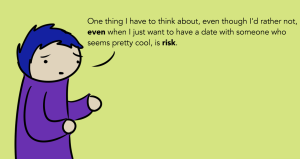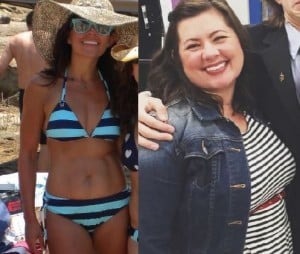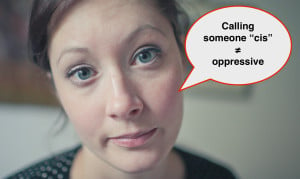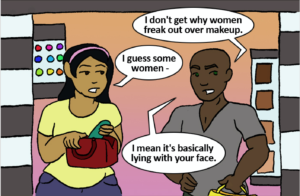For a good portion of my life, I pretended not to be Black.
In fact, I would always get so angry when people in school called me Black, that I would respond by yelling (loudly), “I’m not Black, I’m Mexican!” Despite my “baby hair and afro” as Queen B sings, I refused to identify as Black — even when I would hear mama Maria call herself “negra”.
The reason why I didn’t understand that my Blackness and Latinidad intersected was because race wasn’t a concept I thought about in Mexico, especially in my pueblo in Oaxaca, where variations of Black skin, afros, and big nostrils were the norm.
Because I migrated to the states at the age of 5, my perception of Blackness was an English-speaking, US-born Black body. As a Spanish-speaking, Mexican born person, I internalized my own blackness, meaning that I ran away from my mixed-race identity, and rejected anything that marked me as Black.
And that, predominately, has everything to do with the fact that I knew little to zero history of people of color.
It feels critical to note that my internalized racism is not my fault — and if you’ve ever been in the same situation, it’s not yours either. This is a result of the system we grew up in.
For example, having been a part of the US public education system, I have noticed that the history of slavery has become marginal and even described as a history of “migration” — instead of what it actually is, a history of captivity. Latin America was one of the biggest benefactors of the transatlantic slave trade.
The Afro-descendent population of Brazil is approximately 49.6%, meaning that about half of Brazilians would be racialized as Black if they came to the US. Similar to Brazil, almost 30% of Colombians are Afro-descendants!
But what about my home country? The well-hidden truth about Mexico is that “more than 500,000 Africans were brought to Mexico — which is more than the United Sates at 450,000.”
So, why don’t we know about this history? The reality is that Blackness has been internalized, and silenced in Mexico. It wasn’t until December of 2015 that the government legally recognized Afro-Mexicans.
And even with recognition, Afro-Mexicans, “ are least represented and the most oppressed of all of Mexico’s ethnic groups.”
Having struggled myself to recognize my own Blackness, I want to urge the Latinx community to commit with me and work towards creating a pro-Black Latinx culture. To start, here are 10 actions we can all engage in:
Action 1: Do Not Assume All Latinxs Look A Certain Way
Being an immigrant myself, I know what it is liked to get racially profiled — and to profile others as a way to find folk that look like me so that I can feel safe. However, like Audre Lorde says, “Unity does not require that we be identical to each other.”
In fact, we can only grow stronger if we let each other into our realities, and begin to have conversations about what it means to be Latinx and benefit from passing privilege; what it means to be both Latinx and Black; what it means to be an indigenous Latinx; and what it means to be Latinx from various Asian and Caribbean diasporas.
We need to do this because as Latinxs, we have a history of displacement, of colonization, and of multiple slaveries that have shaped a resilient culture. In order to heal from the violent history our people have suffered, we need to talk about how diverse we are, because when we do, we will finally begin to unite as one culture, and much of that means living with the messiness of our experiences as displaced people.
Action 2: Listen Attentively When Black Folk, Especially Black Womyn Speak
Let’s have a courageous conversation and talk about the ways in which patriarchy manifests in our Latin community. Being raised by 3 afro-Latinx womyn, I noticed the violent way in which the world interacted with them.
My mama always used to tell me, “el machismo es peor alla,” which translates to “the machismo (patriarchy) is worse over there (Mexico).”
But I’ve always wondered, what if it’s just hidden in microaggressions that are harder to see here in the US? I think it’s time that we have a conversation about machismo, and what we can do to challenge it.
For starters, since we have already recognized that Afro-Latinxs have historically been silenced, non-Black Latinxs have to listen attentively when Black Latinxs share their experiences.
Growing up, I learned to see myself as less than others for the sole reason that I am Black, which made me quiet about speaking up against injustice.
It is time that we are heard, and it is also time that our non-Black Latinx community has our back — we need to pay particular attention when Black-Latinx womyn, and Black gender-non-conforming & gender-queer Latinxs speak.
Action 3: Celebrate Melanin
While I am Black, I need to be clear and explain that I am a light-skinned Black person. Growing up, my cousin Jorge, who has a lot more melanin that I do, was often picked on for being dark-skinned. As a light-skinned Black person, this was something that I didn’t always experience.
Once I got to the US, I experienced it much more often because other body features gave it away that I am a child of the African Diaspora.
We need to uplift dark-skinned Black Latinxs by stepping away from comments like “maintaining the race,” that are used to make sure that we, Latinxs, always mate with someone a tone lighter than us; and comments like “que clarita es, que bonita” (she’s so light-skinned, how pretty) that emphasize lightness as beautiful.
We must encourage people to love and celebrate all Black bodies.
Action 4: Gift Latinx Children Black Dolls and Books With Black Characters
Yo, as a child, I secretly loved playing with dolls. I had 4 miniature ones (that I acquired because my mom ordered happy meals for herself sometimes at McDonalds), and my favorite was Jasmine from Aladdin because she looked like my friend Vicky, who is still living at the other side of the border.
However, light-skinned Jasmine was the closest I ever got to a Black doll.
Had I played with Black dolls, I would have had a better relationship to my skin, to my beautiful afro, to my luscious lips, to my nose, and to my body overall.
In addition, having been an immigrant and displaced from my Afro-Indigenous community, I was essentially forced to learn how to socialize in a world where everything that is deemed beautiful is White.
A lot of us have seen the doll experiments, where most children identify the White doll as the nice doll and the Black doll as the mean doll. In the same way, they identity the White doll as more intelligent and the Black doll as less intelligent.
What if I told you that you have the power to re-create a Latinx culture that steps away with this racial bias? One easy thing to do would be to expose Latinx children to Black dolls and books with Black characters early on.
One of my favorite initiatives this year was the #1000BlackGirlBooks, launched by Marley Dias who is simply “sick of reading about white boys and dogs.” I am too, and how about you?
Action 5: Celebrate Curly, Kinky Hair
Wouldn’t it be nice if our entire Latinx community were body positive? I think so, and hair is part of our body, so let’s start by appreciating hair — all types of hair.
Recently, I wrote an article about the different ways that I was taught to hate my afro and it was not a healthy time in my life! In conversation with other friends that have way longer hair than I, they shared that a lot of the treatments they would go through to straighten their hair actually ruined their curls.
Why would we teach each other that something about our bodies was inherently bad or not worthy enough to admire?
In a beautiful spoken word performance, the fierce Elizabeth Acevedo tells it like it is: “You call them wild curls. I call them breathing. Ancestors spiraling.” We have to realize that our hair comes with a history, and often times, a very violent history.
So, if you know someone with curly, kinky hair, celebrate it — and celebrate them! Side note, celebrating curly, kinky hair does not mean touching the hair!
Action 6: Always Remember That The Caribbean Is ALSO Part of Latin America
Sometimes, the Latinx community tends to divide itself into those from the Americas, and those from the Caribbean.
But I struggle to understand why we separate from each other? The more of us, the stronger we are, and the stronger we are, the better we can stand up for each other!
By remembering that the Caribbean is also part of Latin America, we expand our own notions of how a Latinx person looks, the ways in which our culture differ geographically, and what languages we speak.
Did you know that many Afro-Latinxs speak a language other than Spanish (and some, not even Spanish!)? For example, some Afro-Dominicans speak Spanish and Jamaican Patois. Another example is our Central American and Caribbean Afro-Latinx community members that speak Garifuna.
In addition, when we include the Caribbean in our understanding of Latinidad, we also open up a space where we not only celebrate each other, but where we share culture as well. Latinidad is already an amazingly rich culture, so why would we not want to know more about just how beautiful our people are?
Action 7: Demystify The Notion That Black People Are Bad
If we’re being honest, I have to hold myself accountable and speak from a place on intention. As a young Afro-Latinx person, I refused to identify as Black because I thought all Black people were bad.
Sadly, I’m sure that I’m not the only person in the community to have ever thought like this.
A good place to start is by asking, where does this begin? And a big part of it should be accounted to the media. When I moved out of the city for the first time and headed to the suburbs for college, I could not imagine what I heard from my classmates about the murders of Black lives based on the media’s interpretation.
Unfortunately, my classmates were so quick to jump on justifying why Black and Brown youth should have been shot — many would tell me that I was being defensive because I was of color.
Others would tell me that if “Black people weren’t such lazy criminals” they wouldn’t end up dead.
Why is it that we are so quick to name Black people as criminals, instead of recognizing Black folk for who they are, people? We need to re-evaluate the stereotypes that we have about the Black community if we ever want to get anywhere as a Latinx community.
In addition, we really need to be more conscious of what we consume in the media. For example, I challenge y’all to no longer invest time in television shows, movies, or songs that solely depict Black folk as criminals, sex workers, or drug addicts — or that don’t unpack those experiences and professions from a Black feminist perspective.
Consider how powerful and transformative it would be if we invested in media that represents us in ways that are reflective of our everyday lives.
Action 8: Bring Up Afro-Latinidad With Friends & Family That Are Non-Black
As an Afro-Latinx person, I don’t mind sitting down with fellow non-Black Latinx community members to talk about ways to live a pro-Black life. But to be honest that takes a lot of work.
I shouldn’t even have to try to convince my community that I am worthy of acceptance; instead, my wellbeing should already be a priority if I am seen as part of the Latinx community.
One of the most powerful actions an ally can take is engage in courageous conversations with other allies. So, how does this look like? If you’re a non-Black Latinx person, next time you are with another non-Black Latinx person, I challenge you to ask them if they have heard about Afro-Latinidad or Black Latinxs. If they haven’t, this is a perfect opportunity to tell them about what you know — or simply share this article with them.
Another way for you to bring up Afro-Latinidad in non-Black Latinx spaces is by questioning why there are no Afro-Latinx folk in the space. This might just look like starting a conversation with others in the room, and say, “hey y’all, what do you think of committing to bring in Afro-Latinxs into our space?”.
Just to be clear, however, the more Afro-Latinxs you know doesn’t give you brownie points. Allyship is about the actions you take everyday. One earns the title “ally,” and one has to keep earning it!
Action 9: Stand Up For Black Lives
This is one of the most important actions. I am tired, I really am. I am tired of hearing people in my community make up excuses of why they feel targeted by #BlackLivesMatter.
I am tired of hearing people say, #LatinxLivesMatter. We need to understand that when we say #BlackLivesMatter, that already includes the Latinx community — Afro-Latinxs, because we too are being killed at massive rates.
Even though we are Latinxs, our Blackness puts us in a vulnerable position of being victims of racial profiling, police brutality, and racial subjugation.
Maisha Z. Johnson has a beautiful article titled, “5 Ways People Excuse Police Violence Against Black Youth — And What They’re Missing,” that all my non-Black Latinx community members should read before engaging in this work. To echo her words, “As we find reasons to justify these attacks and blame children for state-sanctioned violence against them, we deny children of color the right to be children.” Another great resource on what not to focus on when our community is being killed can be found here.
We need to stand up for Black lives, because if we don’t, we will all lose.
The ways in which White Supremacy works is by pinning communities against each other, thus not permitting us to collectively fight for our own liberation.
We have to stop the dichotomy that the Black community and the Latinx community are separate. Black folk are, and can be, Latinxs in the same way that Latinxs are, and can be, Black!
Action 10: Tell Others About What You’ve Learned
This has been a lot of information, but we can’t just read and share it! We have to process it internally as well as with our community. I hope that this list allows you to also think of new and creative ways to pave a path for a pro-Black Latinx culture and community.
We need to challenge each other and bring the revolution to intimate spaces, meaning to our homes, to our families, to our mentors, to our partners, to our friends, etc.
This is really the only way we can begin to break the systems that oppress us and pin us against each other.
[do_widget id=’text-101′]
Alan Pelaez Lopez is a Contributing Writer for Everyday Feminism and an Afro-Indigenous migrant that grew up in Boston via La Ciudad de México, documenting their existence as an (un)docuqueer poet, jewelry designer, and a huge Frida Kahlo fan. Alan is currently in graduate school pursuing a degree in Comparative Ethnic Studies in the Bay Area, and a member of Familia: Trans, Queer Liberation Movement.
Search our 3000+ articles!
Read our articles about:
Our online racial justice training
Used by hundreds of universities, non-profits, and businesses.
Click to learn more





















